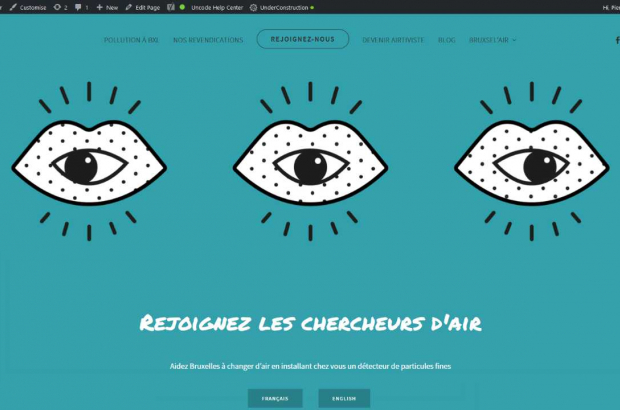- Daily & Weekly newsletters
- Buy & download The Bulletin
- Comment on our articles
Bruxsel'Air seeks volunteers to monitor city's air quality
A citizens' movement to combat air pollution in Brussels is appealing for residents to install air sensors at their homes and offices, to build up a better picture of how clean the air we breathe is.
The Bruxsel'Air movement began in 2016, one year after the Dieselgate scandal broke in September of 2015. The members felt there was still nothing being done about the dangerous levels of air pollution that wreaks havoc on the environment and causes hundreds of premature deaths every year.
The new campaign, called Air Seekers, is meant to put pressure on politicians to take action against air pollution. With a €31 donation, citizens will receive an air sensor to install at their home or office, which will then provide data for the mapping of Brussels’ air quality.
Pierre Dornier, the vice president of Bruxsel’Air, said this campaign is a way of empowering normal citizens to take action against air pollution.
“With this campaign we want to give something very concrete to citizens to do,” Dornier said. “Because a big problem with air pollution is that you can’t see there’s something in the air. It’s invisible.”
There are currently only six air monitoring stations in Brussels, which makes the air quality data imprecise. Dornier also said the data is difficult for the general public to find. This new campaign would hopefully change that.
“We have a map and every time a citizen installs an air sensor, the air sensor will appear on the map.” Dornier said. “And we will give real-time data about air pollution where the citizen installed the censor.”
Dornier believes this campaign will be powerful in two ways. With the information gathered by installing more air sensors, there will be a better understanding of air pollution in Brussels. He also believes that if enough people start installing air sensors in Brussels, politicians will realise how important air pollution is to citizens and feel pressured to do something about it.
Outside of installing an air sensor, there are a few things Dornier suggests that citizens can do on a daily basis to cut down on air pollution. “The best thing to do is to avoid using a car,” he said. “If you can, use the metro, tram, bus, bike, or walk. If you have to use a car, then try to stop the engine as much as possible.”
The most important thing Bruxsel’Air would like to see done to improve air quality in Brussels is to cut down on polluting cars. Things like making the low-emissions zone stricter, switching to more electric buses instead of diesel, and making the city easier and safer for cyclists are all solutions he would like to see.
“There are a lot of solutions,” Dornier said. “The only thing that is lacking is will.”



















Comments
How about making public transportation free, and also comfortable -- like ensuring that, during rush hour, extra cars are added to trains and extra buses are running -- and also adding double-decker buses to the fleets? People want to sit and be able to read or work, or just relax, while using public transportation; they don't want to be herded in and jostled constantly. Feeling hassled and unnerved by the experience of public transportation sends people straight into their cars.
Adding and improving services based on current and potential rider input would (greatly) improve usage numbers as well, as this could help system designers decide on additional routes. Public transportation users much prefer direct routes; once transfers are added in, there's a lot of time wasted (as well as a degree of uncertainty -- will my transfer method be on time, running, etc.?), and people turn to their cars.
Finally, reliability is a big issue, esp. with buses. Sometimes they just don't show up, other times they show up 10-15 minutes late. This is unacceptable, of course -- as riders need to be on time for school and work -- and, yes, sends people straight into their cars.
To attract many, many more riders:
- Free public transportation
- Services increased to the point that all riders get a seat and can ride comfortably.
- ASK potential riders why they don't use public transportation -- their input, and the resulting changes, will help attract many more into the system.
- Bonus, free Wi-Fi on public transportation and at stations/stops so people can work (or just goof off) with their phones and computers.